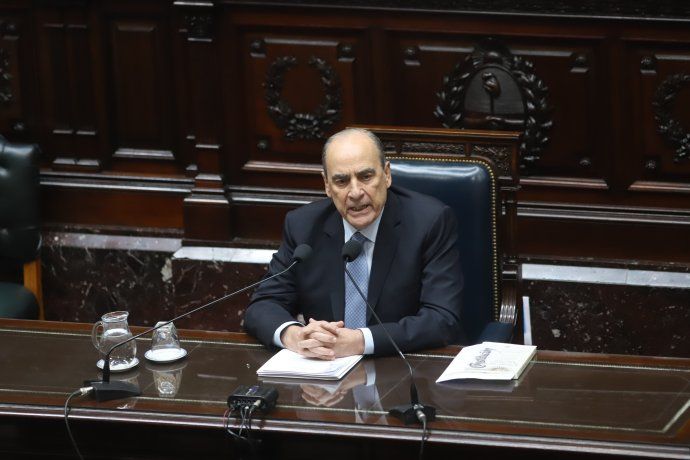The decision of the national government to limit access to the public information gender Strong criticism from the opposition and various organizations. Despite strong rejection, the presidential spokesman, Manuel Adorniconfirmed that the libertarian administration will maintain the modifications that protect the private information of public officials.
“That is the spirit of the law, that we can all access government information, but that this does not go against the privacy of officials,” said Adorni during his usual press conference. Through Decree 780/2024, published in the Official Gazette, the Executive Branch regulated article 1 of Law No. 27,275 and increased the exception criteria for accessing information, as well as established new definitions of the concepts of “public information” and “document”.
Guillermo Francos deputies
In his defence of Gestión, Francos said that “there is no intention to limit access to public information.”
Ignacio Petunchi
Along these lines, the spokesman contradicted Francos who had declared that they are willing to make any modification to a law: “Francos said that we are willing to make any modification to a law or to things that are wrong, but this is not the case where that will happen. This does not preclude the need for additional clarification.”
“During this management we have been asked what brand of tea we drink, what breed and color of pets we have, if our pets are happy, which doesn’t have to matter“, the spokesman justified. He then added: “We were asked if the doctor (Alberto Fernández) took the course The Micaela Law, How many subjects do you teach at the UBA?“We want to put an end to this consumption of so many public resources that people are not informed about what is happening.”
“We are among the first to defend transparency, honesty and to keep people informed of everything,” said Adorni. Regarding the increase in requests for information, the official explained that “In 2020, 57 orders were received, in 2022 95 and in 2023 65 and until August 558. This is not against the information, I am simply trying to sort this out so that things are asked that do not relate to the use of funds and the honesty of the official and that concentrates many resources to address this type of issues”.
Changes in the Law on Access to Public Information
Through Decree 780/2024, published this Monday in the Official Gazette, the Executive Branch regulated article 1 of Law No. 27,275 in what they mentioned as “good faith.” In addition, some articles that had not been included in the 2017 process were also regulated, for example, article 3, which includes the definitions of “public information ” and “document”.
In this way, it was emphasized: “The violation of the principle of good faith by all the actors involved constitutes the assumption provided for in article 10 of the Civil and Commercial Code of the Nation.”
To implement the changes, the libertarian administration modified the concept and scope of what is known as “public information.” In this regard, the text detailed: “Information containing private data generated, obtained, transformed, controlled or held by private individuals or legal entities or due to the absence of a committed public interest shall not be considered public information. unrelated to the management of the obligated subjects listed in article 7 of Law No. 27,275 and its amendment“.
In turn, they did the same with the definition of “document“. In this way, “the definition of document established in Law No. 27,275 and its amendment must be understood as referring to any record that has been generated, that is controlled or that is kept within the framework of state activity. Preparatory deliberations and working papers, or the preliminary examination of a matter, will not be considered public documents,” they clarified.
On the other hand, in the regulations of article 4, the requirements for advancing in the request for access to information were established. To do so, “in the case of a natural person” the applicant must present his or her name and surname, identity document, address and email address.
On the other hand, in the case of a legal entity, it must present “the company name and CUIT and the identification of its representative in the terms of section a). Additionally, a copy of the valid legalized power of attorney that accredits its status as representative or authorized for such purposes,” they stressed.
Regarding exceptions, Article 8 established that “the Exception will be inapplicable when the data subject has given consent for its disclosure. or when the data is closely related to the competencies of public officials.” In turn, the decree also detailed that the exception will be applicable to all information that: “Due to its specificity, can be used to identify routines, movements and locations of a person; its public knowledge, dissemination or disclosure may, directly or indirectly, cause damage and harm; is related to complaints or ongoing investigations that, if made public, may put complainants at risk, witnesses, victims or anyone else involved“.
“In the judicial cases where cases of serious human rights violations, genocide, war crimes or crimes against humanity are investigated and judged The exceptions contained in this article will not apply, and the obliged subject must provide the information required within the framework of the case,” the document clarified.
Source: Ambito
I am an author and journalist who has worked in the entertainment industry for over a decade. I currently work as a news editor at a major news website, and my focus is on covering the latest trends in entertainment. I also write occasional pieces for other outlets, and have authored two books about the entertainment industry.




